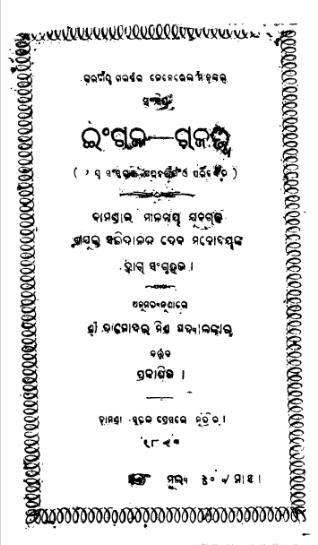Published in 1893, Ingraja Rajatwa, edited by Sachiadananda Deb, is a significant textbook in the history of English language education in India. This work reflects the educational landscape of colonial India, where a growing emphasis on English as a medium of instruction was beginning to take root. Deb’s textbook aimed not only to teach the English language but also to cultivate an understanding of Western literature, culture, and thought among Indian students.
The late 19th century was a crucial period in India’s educational development. Under British colonial rule, English began to gain prominence as a language of administration, education, and social mobility. The introduction of English literature and language into the curriculum was seen as a means of modernizing education and providing opportunities for the Indian populace. Ingraja Rajatwa emerged in this context, addressing the needs of students who were being introduced to English in both academic and practical settings.
Ingraja Rajatwa is structured to provide a comprehensive foundation in the English language. The textbook is likely divided into various sections that cover essential aspects such as grammar, vocabulary, reading comprehension, and composition. Each section is meticulously designed to build students’ language skills progressively, ensuring a well-rounded educational experience.
One of the noteworthy features of this textbook is its inclusion of literary texts, which serves dual purposes: improving language proficiency while exposing students to English literature. Selections from poems, stories, and essays aim to cultivate not only linguistic skills but also an appreciation for literary artistry. By engaging with these texts, students are encouraged to develop critical thinking and a deeper understanding of the cultural contexts surrounding the literature.
Sachiadananda Deb’s approach in Ingraja Rajatwa encapsulates the pedagogical methods of the time, combining traditional teaching techniques with innovative practices. The emphasis on grammar and vocabulary provides students with the tools necessary for effective communication. At the same time, the literary selections promote a love for reading and inspire students to express their thoughts and feelings more eloquently.
The textbook also reflects a broader educational philosophy that balances the acquisition of knowledge with moral and ethical lessons. By integrating cultural references and discussions on social issues present in the literature, Ingraja Rajatwa encourages students to not only learn the language but also engage with the world around them.
Ingraja Rajatwa has a lasting legacy in the realm of English education in India, serving as one of the early efforts to teach the language through a structured curriculum. Its impact is evident in the way it laid the groundwork for subsequent English textbooks, which continued to evolve in response to the changing educational landscape.
The significance of this textbook extends beyond its immediate pedagogical role; it embodies the complexities of cultural exchange during a period when India was grappling with colonial influences. Ingraja Rajatwa represents an attempt to navigate these influences, promoting a form of education that was both modern and rooted in Indian identity.
Books Info
| Books name | Ingraja Rajatwa / ଇଂରେଜ ରାଜତ୍ୱ |
| Author | Sachiadananda Deb |
| No Of pages | 30 |
| Publisher | NA |
| Publication | 1893 |
| Printed At | Chamunda Sundara Press |
| Distributor | NA |

